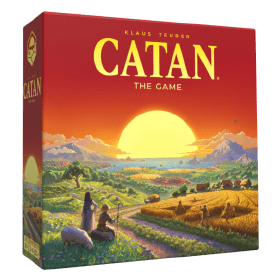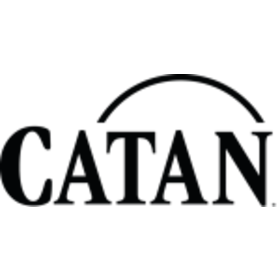CATAN The Settlers of Catan, Die Siedler von Catan, Les Colons de Catane
 Pubblicato inizialmente in Germania nel 1995 come "Die Siedler von CATAN", poi in inglese come "The Settlers of Catan" nel 1996, CATAN celebra il proprio 25° anniversario nel 2020.
Pubblicato inizialmente in Germania nel 1995 come "Die Siedler von CATAN", poi in inglese come "The Settlers of Catan" nel 1996, CATAN celebra il proprio 25° anniversario nel 2020.
Per iniziare il gioco, costruisci la plancia di gioco usando le tessere terreno esagonali. Catan è finalmente nata - una bellissima isola con montagne, pascoli, colline, campi e foreste, circondata dal mare.
Ognuno di voi piazza due piccole case sugli spazi dove si incontrano tre esagoni terreno. Queste sono le vostre colonie di partenza.
E così si inizia. Il giocatore tira due dadi. Un "11"! Ogni esagono di terreno è identificato da un numero. Ogni giocatore che possiede una colonia adiacente a un esagono di terreno con un segnalino corrispondente al numero lanciato, ottiene una risorsa prodotta da questo esagono. Le colline producono argilla, le foreste producono legno, le montagne producono minerali, i campi producono grano, e i pascoli producono lana.
Usa queste risorse per espanderti attraverso Catan: costruisci strade e colonie o migliora le tue colonie in città. Per esempio una strada costa 1 argilla e 1 legno. Se non hai le risorse necessarie, puoi acquistarle scambiandole con i tuoi avversari.
Ogni colonia vale 1 punto vittoria e ogni città vale 2 punti vittoria. Se ti espandi abilmente, puoi essere il primo giocatore a raggiungere i 10 punti vittoria e vincere quindi la partita!
Numero di giocatori: 3 - 4
Durata della partita: 36 mn
Complessità: 2 / 5
Gioca a CATAN e 1229 altri giochi online.
Nessun download, gioca direttamente dal tuo browser.
Con i tuoi amici e migliaia di giocatori da tutto il mondo.
Gratuito.

Gioca a CATAN e 1229 altri giochi online.
Nessun download, gioca direttamente dal tuo browser.
Con i tuoi amici e migliaia di giocatori da tutto il mondo.
Gratuito.

Sommario delle regole
Obiettivo
Ottenere risorse per acquistare vari edifici e carte sviluppo e cercare di essere il primo giocatore a raggiungere i 10 punti.
Impostazione
Il tabellone è composto da colline (mattoni), foreste (legname), montagne (minerali), campi (grano), pascoli (lana) e un deserto (niente) in punti casuali. Ogni terreno, eccetto il deserto, ha un numero da 2 a 12 su di esso. Il deserto inizia con il ladro. Ogni giocatore piazza 2 insediamenti e 1 strada accanto a ciascun insediamento sul tabellone, poi riceve risorse per ogni terreno intorno al secondo insediamento. Gioco
Lancio per la produzione di risorse (obbligatorio): Al proprio turno, si tirano 2 dadi e si calcola la somma.
I terreni con quel numero producono risorse per tutti i giocatori che hanno insediamenti o città accanto a loro (se il ladro non li blocca): 1 risorsa per insediamento e 2 per città. Se si tira un 7, nessuno riceve risorse e i giocatori con 8 o più risorse devono scartarne la metà (arrotondando per difetto). Dovete spostare il ladro su un nuovo terreno e rubare 1 risorsa casuale a un giocatore che ha un insediamento o una città vicino a quel terreno. Commercio (facoltativo): durante il proprio turno è possibile scambiare risorse
- con tutti gli altri giocatori (commercio interno) - con la banca (commercio marittimo) al tasso standard di 4 risorse identiche per 1 o al tasso preferenziale di un porto se avete un insediamento vicino ad esso. Costruire (opzionale): infine, è possibile costruire strade e insediamenti, potenziare gli insediamenti in città o acquistare una carta sviluppo pagando le risorse necessarie.
- le strade devono essere collegate agli insediamenti iniziali e costano 1 mattone + 1 legname (vale 0 punti) - gli insediamenti devono essere collegati da strade agli insediamenti esistenti (tranne all'inizio) e costano 1 mattone + 1 legname + 1 lana + 1 grano (vale 1 punto) - le città sostituiscono un insediamento esistente e costano 3 minerali + 2 cereali (valore 2 punti) - le carte sviluppo costano 1 minerale + 1 lana + 1 grano e comprendono - 14 carte cavaliere che permettono di spostare il ladro su un altro terreno e rubare una risorsa - 2 carte costruzione strade che permettono di costruire strade extra - 2 carte anno di abbondanza che forniscono due risorse gratuite a scelta - 2 carte monopolio che danno a tutti gli altri giocatori un aiuto nella raccolta di risorse o nella costruzione di strade - 5 carte punto vittoria È possibile giocare una carta sviluppo in qualsiasi momento del proprio turno, anche prima del lancio dei dadi, purché sia stata acquistata in un turno precedente e non sia una carta vittoria.
Punteggio
- Insediamenti: ognuno vale 1 punto vittoria. - Città: ognuna vale 2 punti vittoria (1 punto dall'insediamento + 1). - Carte punto vittoria: alcune carte sviluppo valgono 1 punto vittoria. Vengono tenute nascoste finché non si hanno abbastanza punti per vincere. - Esercito più numeroso: il giocatore che ha giocato il maggior numero di carte cavaliere in qualsiasi momento (almeno 3) ottiene la carta esercito più numeroso che vale 2 punti. - Strada più lunga: il giocatore con la strada continua più lunga in qualsiasi momento (almeno 5 segmenti) ottiene la carta Strada più lunga che vale 2 punti. Se c'è un pareggio, il proprietario originale tiene le carte risultato.
Fine del gioco
Se un giocatore ha 10 o più punti vittoria durante il proprio turno (comprese le carte vittoria), li rivela e la partita termina con la sua vittoria.

